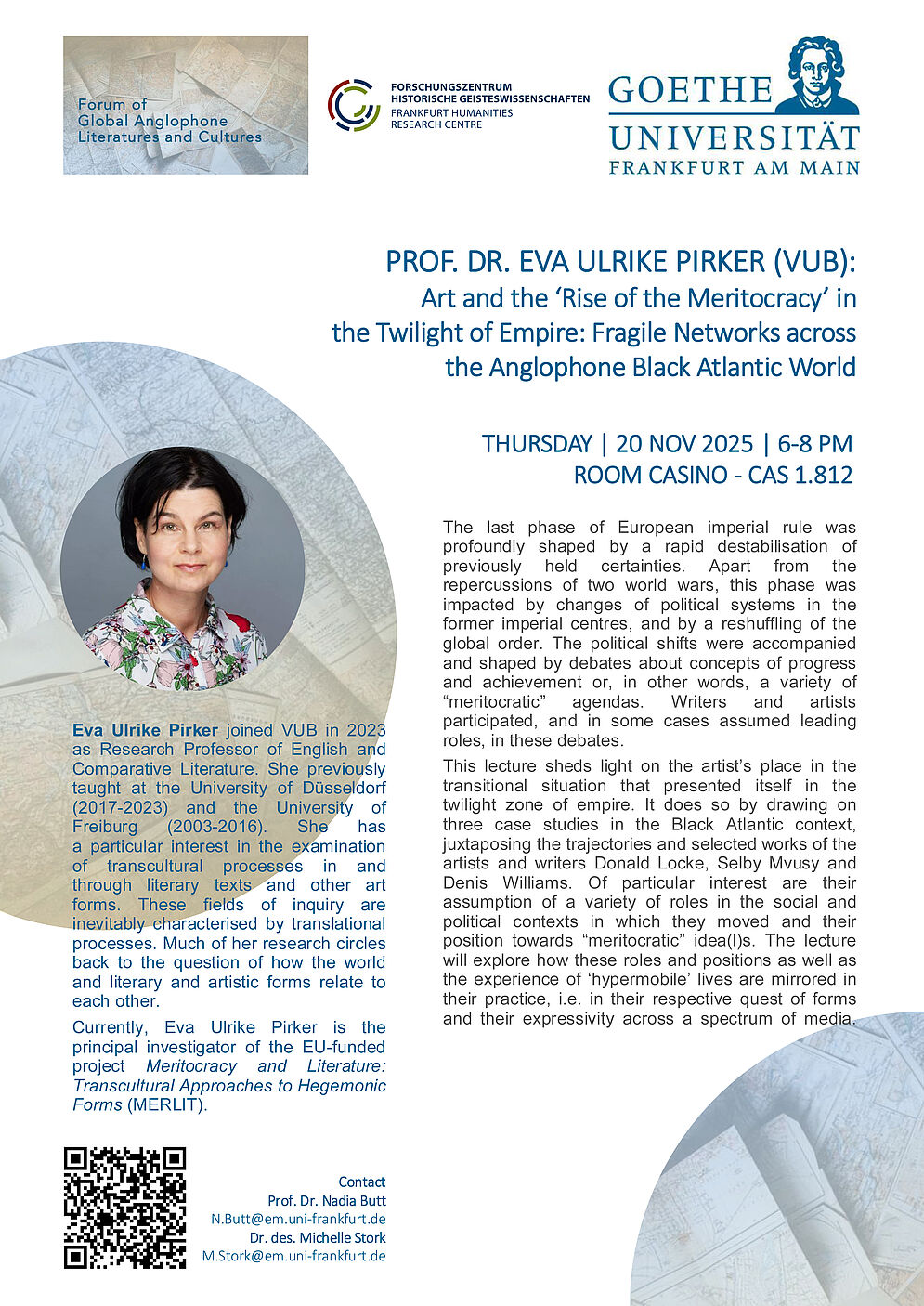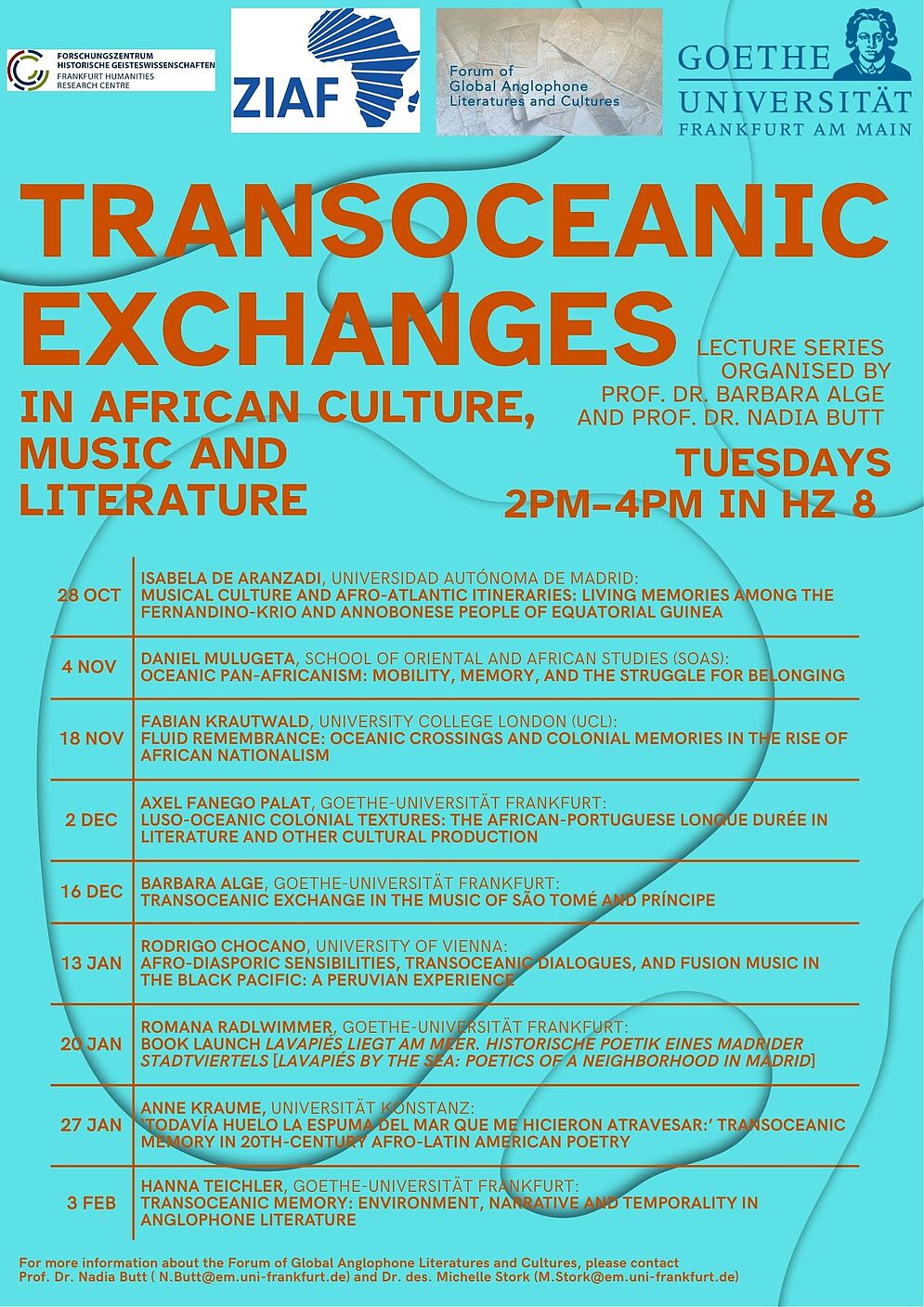Globale anglophone Literaturen und Kulturen
Leitung:
Prof. Dr. Nadia Butt (Anglistik) und Michelle Stork, M.A. (Anglistik)
Aktuelle Informationen finde Sie auf der Webseite des Forums.
Informationen bei: m.stork@em.uni-frankfurt.de
Profil
Die Studiengruppe untersucht die globalen anglophonen Literaturen und Kulturen aus unterschiedlichen Blickwinkeln. Mit einem geographischen Schwerpunkt auf Südasien, Afrika und der arabischen Welt, der Karibik, Kanada, Neuseeland und Australien heben wir die Bedeutung der Auseinandersetzung mit literarischen Texten aus einer transkulturellen und transnationalen Perspektive hervor. Unser Ziel ist es, globale anglophone Literaturen aus einer deterritorialisierten Perspektive zu analysieren.
Sowohl der Untersuchungsgegenstand als auch das wachsende, internationale und interdisziplinäres Forschungsfeld Global Anglophone Studies erstreckt sich über nationale und kulturelle Grenzen hinweg. Globale anglophone Literaturen werden als Literaturen „in Bewegung“ („on the move“, Ette 2003) verstanden, in denen insbesondere die folgenden Themenkomplexe eine wesentliche Rolle spielen: Mobilität und Migration, mobile Kulturen und Gemeinschaften, Heimat und Rückkehr, Diaspora und flexible Staatsbürgerschaft, Kosmopolitismus und multiple kulturelle Zugehörigkeiten.
Eines unserer Hauptziele ist die Vernetzung von Wissenschaftler:innen über Grenzen und Disziplinen hinweg. Somit soll der Forschungshorizont globaler anglophoner Literaturen und Kulturen sowohl theoretisch als auch methodisch ausgebaut werden.
Die Veranstaltungen und Aktivitäten konzentrieren sich auf die folgenden Forschungsbereiche:
1. Transkulturelle und transnationale Studien
In Abkehr von der im 18. Jahrhundert von Gottfried Herder vertretenen Vorstellung von Kulturen als in sich geschlossenen Sphären konzentriert sich die Forschung in diesem Bereich auf transkulturellen und transnationalen Dimensionen literarischer Texte. Die globalen anglophonen Literaturen zeigen kulturelle Rekonfigurationen über territoriale, nationale und kulturelle Grenzen hinweg auf. Da sie statt eines „Kampfs der Kulturen“ (Huntington 1996) eher kulturelle Fusionen und Aushandlungsprozesse behandeln werden Räume neuer kultureller Verbindungen gezeigt, die ein zentraler Fokus der Analyse sind.
2. Mobilität und Migrationsforschung
Da Massenbewegungen von Menschen und Produkten die Welt zunehmend verändern, konzentriert sich dieser Bereich auf die Untersuchung komplexer Muster globaler Mobilität und Migration im Zuge heutiger kultureller Übersetzungen, wie sie in globalen anglophonen Literaturen thematisiert werden. Unter Berücksichtigung der verschiedenen Formen von Mobilität und Migration werden die verschiedenen Ausläufer dieser Phänomene analysiert, darunter Nomadentum, Fernweh, Vertreibung, Exil und Diaspora sowie weitere Formen der Migration.
3. Bewegte Kulturen, reisende Gattungen
Angesichts der globalen Moderne sind Kulturen in ständigem Wandel begriffen. Das schlägt sich in verschiedenen literarischen Gattungen wie Autobiografien, Memoiren, Romanen, Kurzgeschichten, Gefängnistagebüchern, Flüchtlingsberichten, Brieferzählungen und Tagebuchaufzeichnungen nieder. Sie alle können als „reisende Gattungen“ („traveling genres“, Cohen 2003) konzeptualisiert werden, da sie nicht nur die Dynamik der sich bewegenden Kulturen zum Ausdruck bringen, sondern auch die Mobilität literarischer Gattungen zeigen.
Studiengruppe
Ziel der Studiengruppe ist es, Doktorand:innen der Goethe-Universität Frankfurt sowie anderer Universitäten die Möglichkeit zu geben, ihre laufenden Arbeiten zu präsentieren, Feedback zu erhalten und Kontakte zu knüpfen. Die Gruppe fungiert als Plattform für angehende Wissenschaftler:innen, die daran interessiert sind, mit anderen Forschenden auf ihrem Gebiet in Kontakt zu treten und ihre eigene Forschung somit zu erweitern.
Außerdem werden regelmäßig Gastvorträge renommierter nationaler und internationaler Wissenschaftler:innen stattfinden.
Die Studiengruppe ist angesiedelt im Forschungsfeld 1 des Forschungszentrums. Sie richtet sich an Studierende und Forschende aller Qualifikationsstufen. Interessierte sind herzlich willkommen.

